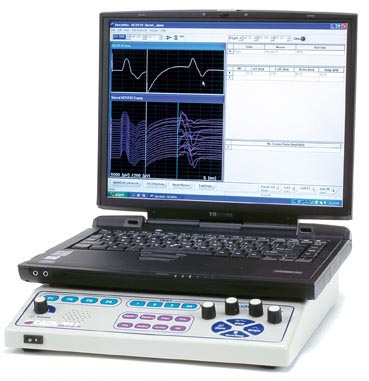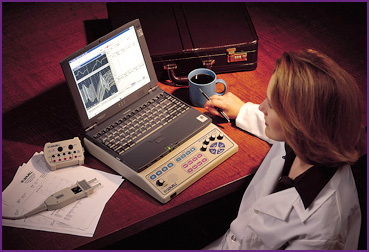
NVC's Aid in the Evaluation of:
EMG's Aid in the Evaluation of:
Musculoskeletal ultrasound aid in the evaluation of: .
DEP's aid in the evaluation of: .
SSEP's aid in the evaluation of: .

 What is a Nerve Conduction Study?
What is a Nerve Conduction Study?Nerve conduction studies or NCV pertains to the activation of nerves ellectrically using a dose of safe small sized pulses over a number of points on the skin most commonly on the limbs, followed by the measurement of the responses gathered. The responses or signals are typically measured starting from the particular nerve or from a muscle supplied by the activation of nerve. This unveils information about the health status of the nerve, muscle and neuromuscular junction, which is the part responsible for communication between the muscle and nerve.
What is the use of a Nerve Conduction Study?
A Doctor or Physcian can recommend for the patient to undergo the test There is a number of conditions that can be evaluated with this technique. Typically, the test is requested after the patient experiences symptoms that hint at some problem with the nerves. These may include numbness, tingling, weakness or pain. In addition, the patient may experience weakness or pain in muscles. These symptoms may come up even after the physical examination results are normal. Occasionally there might be cases in which no abnormality might be noticeable by the eye, and the test can then be reassuring, even if it cannot detect all conditions. In simple terms, the test is useful for detecting the presence of a significant abnormality. Other tests can be performed to determine the exact nature of the problem.
 What Insurance Covers Testing?
What Insurance Covers Testing?3D Medical Diagnostics accepts third party liens such as compensation, personal injury liens, PPOs, and POS health insurances.
Please inform your doctor if you: * Are currently taking any medications, for certain medications act on the nervous system and can change or affect electromyogram EMG results. You may be required to stop taking these medications 3 to 6 days before the test. * Have experienced bleeding problems or take blood thinners, such as warfarin (Coumadin) or heparin. If indeed you are taking blood thinners, your doctor will inform you when to stop taking them before the test. * Have a pacemaker. Other things you may consider prior the test: If you smoke please not do so at least 3 hours before the test. Do not consume drinks or foods that contain caffeine at least 3 hours before the test. In order to test the muscles and nerves it is best to wear loose-fitting clothes. You may be issued a hospital gown to wear during testing. You may be asked to sign a consent form for an EMG. Speak to your Ddctor if you have any concerns regarding the need for the test, possible risks, it's procedures, and or what the results mean. .






